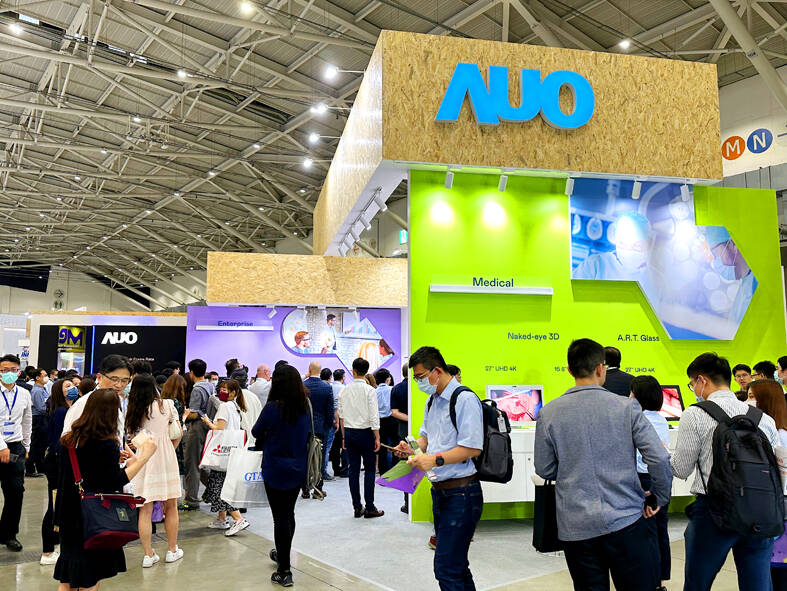LCD panel maker AUO Corp (友達光電) might file an appeal or take other measures to fight a recent court ruling in South Korea that ordered the company and its Taiwanese rival HannStar Display Corp (瀚宇彩晶) to pay compensation for alleged price-fixing.
In an announcement posted on the Taiwan Stock Exchange on Monday, AUO said that it would either appeal or take other “appropriate actions” against the ruling.
AUO would also make appropriate provisions for the possible compensation, which could hit 29.1 billion won (US$22.53 million) plus interest, the company said, adding that the ruling is unlikely to affect its operations.

Photo: Chen Mei-ying, Taipei Times
HannStar, which has been ordered to pay 3.79 billion won plus interest, said it had not yet received any court documents, but when it does, it would file an appeal.
With interest included, the compensation could rise to 53.5 billion won for AUO and 6.97 billion won for HannStar, according to news reports from South Korea.
Citing unnamed sources, South Korean news media on Monday said that AUO and HannStar were recently ordered by the Seoul Central District Court to pay damages to LG Electronics Inc for fixing the prices of TFT-LCD panels.
AUO and other flat-panel manufacturers and distributors in Taiwan, Japan and South Korea were accused by the US Department of Justice in the late 2000s of colluding to fix prices of TFT-LCD panels during secret bilateral and multilateral meetings dubbed the “crystal meetings” from 2001 to 2006.
AUO and its US unit, AU Optronics Corp America, were found guilty of the price-fixing conspiracy in March 2012.
Eight other companies pleaded guilty and have paid more than US$1.39 billion in criminal fines since 2008.
LG Electronics initially sued five Taiwanese companies in a civil case, following the criminal case brought by the US Department of Justice, but dropped the lawsuit against the three companies other than AUO and HannStar.
According to news reports from South Korea, the court dismissed the Taiwanese companies’ arguments that the lawsuit should be heard in their country of origin, ruling that the case and the parties involved have a practical connection with South Korea.

CAUTIOUS RECOVERY: While the manufacturing sector returned to growth amid the US-China trade truce, firms remain wary as uncertainty clouds the outlook, the CIER said The local manufacturing sector returned to expansion last month, as the official purchasing managers’ index (PMI) rose 2.1 points to 51.0, driven by a temporary easing in US-China trade tensions, the Chung-Hua Institution for Economic Research (CIER, 中華經濟研究院) said yesterday. The PMI gauges the health of the manufacturing industry, with readings above 50 indicating expansion and those below 50 signaling contraction. “Firms are not as pessimistic as they were in April, but they remain far from optimistic,” CIER president Lien Hsien-ming (連賢明) said at a news conference. The full impact of US tariff decisions is unlikely to become clear until later this month

With an approval rating of just two percent, Peruvian President Dina Boluarte might be the world’s most unpopular leader, according to pollsters. Protests greeted her rise to power 29 months ago, and have marked her entire term — joined by assorted scandals, investigations, controversies and a surge in gang violence. The 63-year-old is the target of a dozen probes, including for her alleged failure to declare gifts of luxury jewels and watches, a scandal inevitably dubbed “Rolexgate.” She is also under the microscope for a two-week undeclared absence for nose surgery — which she insists was medical, not cosmetic — and is

GROWING CONCERN: Some senior Trump administration officials opposed the UAE expansion over fears that another TSMC project could jeopardize its US investment Taiwan Semiconductor Manufacturing Co (TSMC, 台積電) is evaluating building an advanced production facility in the United Arab Emirates (UAE) and has discussed the possibility with officials in US President Donald Trump’s administration, people familiar with the matter said, in a potentially major bet on the Middle East that would only come to fruition with Washington’s approval. The company has had multiple meetings in the past few months with US Special Envoy to the Middle East Steve Witkoff and officials from MGX, an influential investment vehicle overseen by the UAE president’s brother, the people said. The conversations are a continuation of talks that

CHIP DUTIES: TSMC said it voiced its concerns to Washington about tariffs, telling the US commerce department that it wants ‘fair treatment’ to protect its competitiveness Taiwan Semiconductor Manufacturing Co (TSMC, 台積電) yesterday reiterated robust business prospects for this year as strong artificial intelligence (AI) chip demand from Nvidia Corp and other customers would absorb the impacts of US tariffs. “The impact of tariffs would be indirect, as the custom tax is the importers’ responsibility, not the exporters,” TSMC chairman and chief executive officer C.C. Wei (魏哲家) said at the chipmaker’s annual shareholders’ meeting in Hsinchu City. TSMC’s business could be affected if people become reluctant to buy electronics due to inflated prices, Wei said. In addition, the chipmaker has voiced its concern to the US Department of Commerce